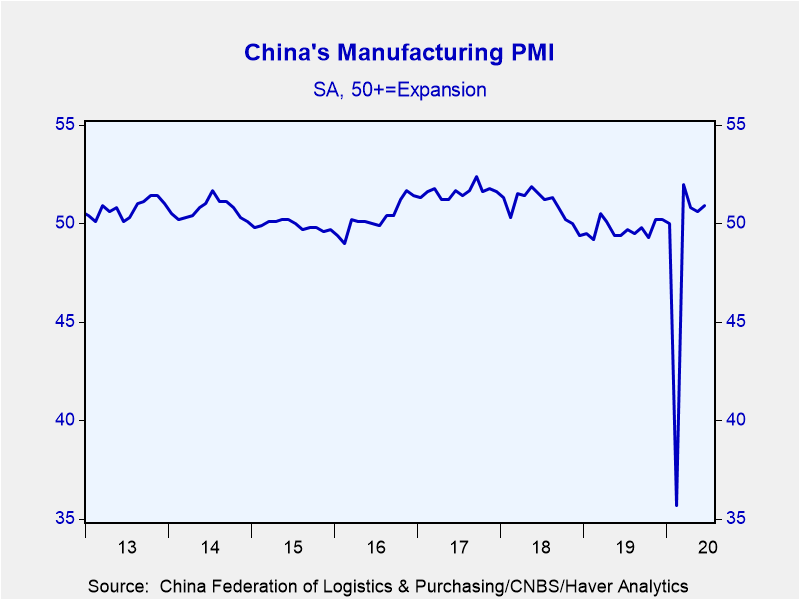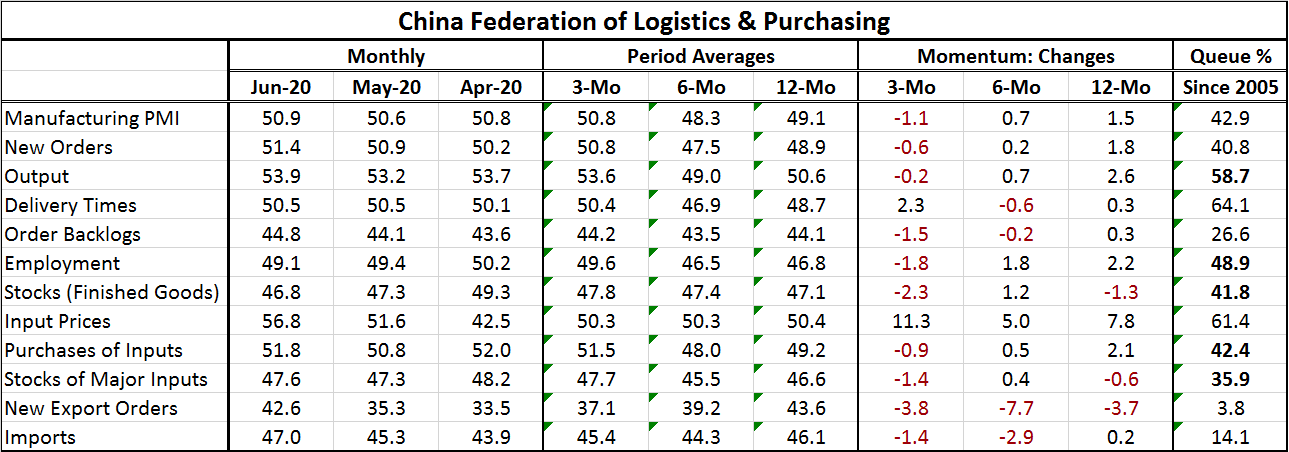 Global| Jun 30 2020
Global| Jun 30 2020China's Manufacturing PMI Shows Resilience But Not a Hint of Strength
|in:Viewpoints
Summary
China's manufacturing PMI gained ground at a snail's pace recovering the minor ground lost in May. China's manufacturing PMI has been above 50 every month this year except for February when the virus outbreak led to a shutdown in [...]
 China's manufacturing PMI gained ground at a snail's pace recovering the minor ground lost in May. China's manufacturing PMI has been above 50 every month this year except for February when the virus outbreak led to a shutdown in Wuhan and the PMI gauge fell to 35.7 for one month.
China's manufacturing PMI gained ground at a snail's pace recovering the minor ground lost in May. China's manufacturing PMI has been above 50 every month this year except for February when the virus outbreak led to a shutdown in Wuhan and the PMI gauge fell to 35.7 for one month.
What it is nonetheless clear for China is that even with this resilience China shows a weakening PMI trend over the last three months. And the previous three months includes that weak February observation. Average calculations show three-months weaker than six-months. But three-month changes from March to June levels show weakness in nine of 11 components as well as in the headline. The queue standing of the headline is still below its median at its 42.9 percentile with only two components with a ranking above 50. China's new export orders are exceptionally weak.

Lessons?
It is not clear what the lesson is from China since its data are suspect and Western nations are widely of the opinion China has not told us all it knows about what happened. China has not been cooperating and has been blocking any inquiry. But on the surface, the Chinese centralized control economy with massive 'Big Brother' spying capabilities has run rings around the capability of any Western nation to corral and control the spread of the virus. The Chinese have such a network that they might be able to do contact tracing on mosquitos. In the U.S., a CDC official has said that the U.S. has way too much virus to control it, an ominous overview. This comes as top U.S. disease expert Anthony Fauci, who is due to testify to Congress, says an "alarmingly large" number of Americans are "anti-science". But is that really true? Separately… is that what the problem is?
The U.S. experience
It was not Americans skeptical of science but rather the CDC itself that bungled the message on risks from the start saying 'no' then 'yes' on masks… and now acting as though a mask is essential all-the-time. The CDC did not endorse the early closing of the U.S. borders when the pandemic was spreading from China and through Europe and into the U.S. The CDC endorsed the shelter in-place for everyone and now 40% of U.S. deaths have been in nursing homes where people sheltered in-place and the infection was not kept out. Moreover, CDC has no plan other than to keep shutting the economy and damping the spread of infection- a very expensive strategy and one that has to be repeatedly engaged. Fauci has never spoken of the NYC data that find that the pandemic is not really very lethal to healthy people! In a city of 8.8 mln with the pandemic running for a solid five months, it killed only 110 truly healthy people. It did kill 17,500 overall but 15,500 of these had other medical problems that contributed to them being in an already weakened state and 2K had unknown medical histories, only 110 people died in NYC who were known to be healthy at the time they caught the virus. So what is Fauci's view of science anyway? The coverage of the pandemic has become so wholly political I cannot believe any of the coverage I see on TV. I am disgusted by this.
The CDC and the medical establishment have in my view made grave errors in judgement and are trying to stay the course because they do not want their decision second-guessed. Anyone that 'knows science' knows that even in science there are disputes about how to do things. The people running the anti-disease effort in the U.S. are using the term 'science' to shut down criticism of what has been done. A disease that killed fewer healthy people in NYC that automobile traffic does in five months shut the city down. Think about that. I think we need to think about what science means before we brandish the term around as something that is neglected or being disbelieved. Many non-epidemiologists have been critical of what commandeering hospitals has done to people with non-Covid-19 medical problems. Many doctors are concerned about what being shut in has done to America's heath. Pediatricians and psychologists are concerned what the impact of the lockdown will be on children and others…and I could go on. Fauci is using his 'public safety pulpit' not to advance the cause of science but to protect and enforce his own flawed decision-making.
Be careful who you trust and believe and don't trust or believe ME on this! Look to the true sources: Trust Noble Laureate Michael Levitt (here) who says we should push for MORE controlled infection and herd immunity. Trust Dr. Zach Bush (here) who reminds us that SARs, bird flu and MERs all circulated for about two years then they went away for good – on their own. In other words, there is REALLY no science in the view we should wait for a vaccine to be developed. By the time we get one, we won't need it and because of the bum's rush to get one, it may not even be safe when it is developed. Trust Dr. Dolores Cahill, a highly credentialed Irish scientist, who also believes economies should not have been shutdown for this (here). Trust Dr. Shiva Ayyadurai, an MIT PhD, (here) who urges the use of vitamin therapy to fight coronavirus. These are just a few of scientific names that disagree with Dr. Fauci and who cannot be said to be anti-science. Please dear readers open your minds! Read! Stop getting your news from Fox or CNN - these are not objective sources. You must look more broadly to credentialed experts. When you do that you will find plenty of highly credentialed criticism of what CDC has done and it is not that Americans reject science. That certainly may have 'some truth to it' but it is pathetic as an overarching excuse or reason. It is a tactic to stop any disagreement or brand it as facile.
Viewpoint commentaries are the opinions of the author and do not reflect the views of Haver Analytics.Robert Brusca
AuthorMore in Author Profile »Robert A. Brusca is Chief Economist of Fact and Opinion Economics, a consulting firm he founded in Manhattan. He has been an economist on Wall Street for over 25 years. He has visited central banking and large institutional clients in over 30 countries in his career as an economist. Mr. Brusca was a Divisional Research Chief at the Federal Reserve Bank of NY (Chief of the International Financial markets Division), a Fed Watcher at Irving Trust and Chief Economist at Nikko Securities International. He is widely quoted and appears in various media. Mr. Brusca holds an MA and Ph.D. in economics from Michigan State University and a BA in Economics from the University of Michigan. His research pursues his strong interests in non aligned policy economics as well as international economics. FAO Economics’ research targets investors to assist them in making better investment decisions in stocks, bonds and in a variety of international assets. The company does not manage money and has no conflicts in giving economic advice.


